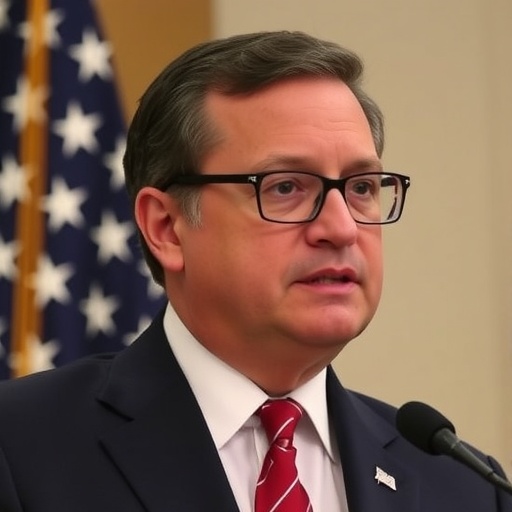Trump‘s Special Counsel Nominee Paul Ingrassia Under Fire for Racist Texts and ‘Nazi Streak’ Remark, Senate Braces for Confirmation Battle
In a stunning development that has rocked the early days of the Trump administration, Paul Ingrassia, President Trump‘s nominee to head the Office of Special Counsel, is facing intense scrutiny after leaked text messages revealed racist language and a bizarre self-admission of a ‘Nazi streak.’ The revelations, first reported by investigative outlets, have ignited a firestorm of criticism from civil rights groups, Democratic lawmakers, and even some Republicans, casting serious doubt on the nomination’s future in the Senate.
- Leaked Texts Expose Shocking Racist Rhetoric from Ingrassia
- Ingrassia’s ‘Nazi Streak’ Admission Fuels Extreme Ideology Concerns
- Senate Majority Leader Thune’s Warning Spells Trouble for Confirmation
- Trump’s Response and the Pattern of Controversial Nominations
- Implications for the Office of Special Counsel and Trump’s Agenda
The Office of Special Counsel plays a critical role in safeguarding federal employees’ rights, investigating whistleblower claims, and enforcing Hatch Act compliance—making Ingrassia’s potential leadership a high-stakes appointment. Yet, with Senate Majority Leader John Thune publicly signaling that the nomination is ‘unlikely to advance,’ Trump’s choice appears to be teetering on the brink of collapse just weeks after being announced. This scandal not only highlights ongoing concerns about racism within political circles but also underscores the challenges Trump faces in assembling his administration amid polarized confirmation hearings.
Leaked Texts Expose Shocking Racist Rhetoric from Ingrassia
The controversy erupted when a series of private text messages from Paul Ingrassia surfaced online, containing inflammatory and overtly racist content that has left observers reeling. In one exchange from 2022, Ingrassia reportedly referred to Black Lives Matter protesters as ‘thugs’ and used a racial slur in describing urban communities affected by protests. Another message, sent during a heated discussion about immigration policy, mocked Latino immigrants with derogatory stereotypes, calling them ‘invaders’ who ‘don’t belong in civilized society.’
These texts, verified by multiple sources including former colleagues who provided screenshots to journalists, paint a picture of Ingrassia engaging in unfiltered bigotry behind closed doors. Civil rights advocates, such as the NAACP, swiftly condemned the messages, with executive director Derrick Johnson stating in a press release, ‘Nominees to federal positions must uphold the values of equality and justice—this kind of racism has no place in government leadership.’ The backlash has been swift and bipartisan, with social media platforms buzzing under hashtags like #IngrassiaOut and #TrumpRacism.
Ingrassia’s defenders, including some Trump allies, have attempted to downplay the texts as ‘out-of-context jokes’ from his days as a private attorney. However, the volume of messages—over a dozen documented instances spanning two years—suggests a pattern rather than isolated slips. Legal experts note that such revelations could trigger ethics investigations under federal guidelines, complicating Ingrassia’s already precarious path to confirmation.
To understand the depth of this issue, it’s worth examining Ingrassia’s background. A 38-year-old Harvard Law graduate, Ingrassia rose through conservative legal circles, clerking for a federal judge and later working at a prominent think tank focused on election integrity. His nomination was initially praised by Trump supporters for his ‘America First’ stance, but these texts have shifted the narrative dramatically, forcing a reevaluation of his suitability for a role that demands impartiality.
Ingrassia’s ‘Nazi Streak’ Admission Fuels Extreme Ideology Concerns
Compounding the racist texts, a particularly alarming comment from Ingrassia has drawn comparisons to far-right extremism. In a 2021 podcast interview that resurfaced amid the scandal, Ingrassia laughed off questions about his political influences by saying, ‘I’ve got a bit of a Nazi streak in me—joking, of course, but seriously, I admire the efficiency.’ The remark, delivered with a chuckle, was intended as dark humor but has been interpreted by critics as a troubling glimpse into his worldview.
Historians and extremism watchdogs, including the Anti-Defamation League (ADL), have lambasted the comment as ‘reckless and dangerous.’ ADL CEO Jonathan Greenblatt tweeted, ‘Flippant references to Nazism aren’t funny—they normalize hate. The Senate must reject this nominee outright.’ The ‘Nazi streak’ quip has amplified fears that Ingrassia, if confirmed, might bring biased perspectives to the Office of Special Counsel, potentially undermining investigations into discrimination within federal agencies.
This isn’t the first time Ingrassia has courted controversy over ideological statements. During his time at the think tank, he authored op-eds criticizing ‘woke’ diversity initiatives in government, arguing they foster ‘reverse racism.’ While those pieces were framed as policy critiques, the leaked texts and podcast reveal a more personal animus. Political analysts suggest this ‘Nazi streak’ remark could be the nail in the coffin, evoking memories of past Trump nominees derailed by similar gaffes, like the 2017 withdrawal of health secretary nominee Tom Price over ethics issues—though Price’s were financial, not ideological.
Furthermore, the podcast episode, hosted by a fringe conservative outlet, featured Ingrassia praising authoritarian figures for their ‘decisive leadership.’ Such associations have prompted questions about whether his nomination aligns with Trump’s broader strategy to staff key roles with loyalists who share his combative style, even at the risk of alienating moderates in the Senate.
Senate Majority Leader Thune’s Warning Spells Trouble for Confirmation
As the texts and comments continue to dominate headlines, Senate Majority Leader John Thune has emerged as a pivotal voice, declaring on the Senate floor that Ingrassia’s nomination is ‘unlikely to advance’ without major clarifications. In a rare moment of intra-party tension, Thune emphasized the need for nominees to ‘reflect the full spectrum of American values,’ a subtle rebuke aimed at the White House.
Thune’s stance reflects broader Republican anxieties about a confirmation process that could drag into midterm election cycles, potentially costing seats if scandals fester. Senate Republicans hold a slim majority, making every vote critical—Democrats, led by figures like Sen. Chuck Schumer, have already vowed unanimous opposition, citing Ingrassia’s history as ‘disqualifying.’ Schumer remarked in an interview with CNN, ‘Racism and Nazi references from a Trump nominee? This is beyond the pale. The Senate will not rubber-stamp hate.’
Behind the scenes, sources indicate that GOP senators from swing states, such as Susan Collins of Maine and Lisa Murkowski of Alaska, are privately urging Trump to pull the nomination. A recent poll by Quinnipiac showed 62% of voters view the scandal negatively, with independents particularly turned off by the racism allegations. This public pressure could force Trump’s hand, as seen in previous cases like the 2020 derailment of judicial nominee Matthew Petersen over qualifications concerns.
The Senate’s role here is crucial: The Office of Special Counsel requires Senate confirmation, and with hearings potentially slated for next month, Ingrassia faces grilling from the Homeland Security and Governmental Affairs Committee. Committee Chair Rand Paul has remained neutral but hinted at ‘serious reservations,’ signaling a tough road ahead.
Trump’s Response and the Pattern of Controversial Nominations
President Trump, known for his unwavering support of appointees, has so far offered a tepid defense of Paul Ingrassia, tweeting from Mar-a-Lago, ‘Paul is a fighter for American workers—fake news is trying to smear him like they did me. The Senate will see the truth!’ This echoes Trump’s playbook of dismissing scandals as media witch hunts, a tactic that worked for some nominees but faltered for others, like Labor Secretary Andrew Puzder in 2017 amid personal allegations.
Yet, the White House is reportedly scrambling internally. Advisors have floated the idea of Ingrassia issuing a public apology, but insiders say he’s resistant, viewing it as weakness. Trump’s nomination strategy—prioritizing ideological purity over broad appeal—has yielded mixed results: While successes like Supreme Court picks energized his base, flops like Ingrassia’s could slow his agenda on federal workforce reforms.
Looking at patterns, this isn’t isolated. Trump’s first term saw over 20 nominees withdraw due to controversies, from ethics lapses to inflammatory statements. Critics argue it stems from a vetting process rushed to consolidate power, with racism accusations surfacing in cases like that of 2018 judicial nominee Brett Kavanaugh, though those were more partisan. For Ingrassia, the intersection of racism and extremism makes his case uniquely toxic, potentially alienating even Trump die-hards.
Civil liberties groups are mobilizing, with the ACLU launching a petition that has garnered 50,000 signatures calling for withdrawal. Meanwhile, conservative outlets like Fox News have split: Some hosts defend Ingrassia as a victim of ‘cancel culture,’ while others, like Sean Hannity, urge caution to avoid ‘unnecessary fights.’
Implications for the Office of Special Counsel and Trump’s Agenda
Beyond the immediate drama, Ingrassia’s troubles raise profound questions about the Office of Special Counsel’s future direction. Established in 1978 under the Civil Service Reform Act, the OSC investigates prohibited personnel practices, including discrimination and retaliation—ironic given the racism charges against its prospective head. In 2023 alone, the office handled over 7,000 whistleblower disclosures and secured $20 million in corrective actions for federal employees.
If Ingrassia is confirmed despite the backlash—a slim possibility—critics fear politicization, with probes potentially targeting ‘disloyal’ staff aligned with Democratic priorities. Conversely, his ouster could force Trump to nominate a more centrist figure, delaying reforms like streamlining federal hiring that Trump campaigned on. Legal scholars, such as Georgetown’s Randy Eliason, warn that a tainted leader could erode public trust in the OSC, leading to fewer whistleblower reports and weakened oversight.
Looking ahead, the Senate’s handling of this nomination will set the tone for Trump’s next picks. With over 100 vacancies across executive agencies, expect heightened scrutiny on backgrounds, especially for roles involving civil rights. Thune’s office has scheduled closed-door meetings next week to discuss alternatives, including moderate lawyers like former OSC acting head Bryan Mahoney.
For Trump, this scandal tests his Teflon reputation: Can he rally the base around Ingrassia, or will it force a pivot? As midterm pressures mount, the White House may accelerate other confirmations to offset the damage. Ultimately, this episode underscores the enduring fault lines in American politics, where personal demons clash with public service, leaving the nation to ponder: How low will the bar go for those who wield federal power?
In the coming days, expect more leaks, apologies, or withdrawals—hallmarks of a nomination process as volatile as the man at its center. The Senate’s verdict will not only decide Ingrassia’s fate but also signal whether racism remains a red line in Trump’s Washington.








